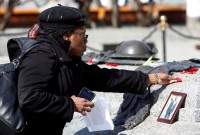Support strong Canadian climate journalism for 2025
Passchendaele. More than 500,000 people, including 15,000 Canadians, were killed or wounded during the prolonged fight, as weeks of rain and shell fire churned the battlefield into a sea of mud.
Yet amid the horror that enveloped a small part of Belgium in the summer and fall of 1917, were nine Canadians who would be awarded the Victoria Cross, the British Empire's highest medal for bravery.
Now one of those Victoria Crosses, awarded to 24-year-old Cpl. Colin Barron for his actions exactly 100 years ago Monday, is set to go up for auction on Dec. 5.
"What's fascinating about Barron is not just the calibre of the citation, but one might even call it a suicidal mission to do what he did," said David Erskine-Hill, a medal specialist at Spink, the London auction house selling the cross.
"He strikes me as a soldier's soldier. He's out there to help his comrades, get them past this appalling strong point. So ultimately while he takes life, the enemy, he saves life, his comrades."
The story goes that frustration drove Barron to action.
On Nov. 6, 1916, a cold drizzle was falling on the muddy, shell-torn and blood-soaked fields surrounding the Belgian village and ridge bearing the Passchendaele name.
The men of the Canadian Corps — clerks, farmers, miners, lumberjacks, shopkeepers and, in Barron's case, railway workers — had been fighting in the quagmire for two weeks after relieving other allied troops.
Barron was part of the third assault on the ridge. A native of Scotland, he had moved to Canada in 1910 before enlisting in Toronto in 1914 and crossing the Atlantic to fight the Germans.
The ridge was heavily defended by a German pillbox and five machine-guns. The Canadians had tried several times to get close enough to throw grenades, only to be thrown back with heavy casualties.
The attack appeared on the verge of collapse when Barron, whose daughter would later describe him to author Stephen Snelling as "a bit of a devil" in his youth, took matters into his own hands.
"Barron, who was commanding one of the battalion's Lewis gun sections, had grown frustrated by the repeated reverses. So he decided to show the way," Snelling wrote in his book VCs of the First World War: Passchendaele 1917.
"Worming his way round the flank, lugging his weapon with him, he somehow managed to reach a position close by the strongpoint without being seen. Then, he opened fire at 'point-blank range' with devastating results."
The citation for Barron's Victoria Cross would later credit his actions with having "produced far-reaching results, and enabled the advance to be continued."
The Canadians would suffer horribly at Passchendaele and historians have since questioned whether it had any real impact on the war.
"Historians see it as proof of reckless leadership," Prime Minister Justin Trudeau said during a low-key ceremony in Ottawa on Friday marking the 100th anniversary of Passchendaele.
"And still," he added, "we remember this battle with pride, as we think of our brave soldiers, who fought an impossible fight with perseverance, valour and commitment to a greater cause."
After the war, Barron tried to join the RCMP, only to be told that he was too short. He became a member of the Ontario Provincial Police instead, before re-enlisting during the Second World War.
He died at Sunnybrook Hospital in Toronto in 1958.
Barron's Victoria Cross is being sold by the family of a collector who recently died, Erskine-Hill said; it's unclear when or how the collector acquired it, but the medal is no longer with Barron's family.
A total of 96 Victoria Crosses have been awarded to Canadians since the award was established in 1856, but none since the Second World War.
The last to come up at auction was awarded to Maj. David Currie during the Second World War and was sold to a British collector in August for $550,000.
Bidding for Barron's is expected to start at around $250,000 and while the Canadian War Museum was among those who bid on Currie's medal, it won't say if it will participate this time around.
Erskine-Hill acknowledged that some might question putting what is essentially a piece of Canadian history up for sale, but he said most collectors consider themselves "custodians" of such medals.
"They are very keen on research, very keen on recalling the deeds of these men," he said, noting that many collectors will loan or even offer medals to museums.
"If those medals just lay in a box, in a drawer, or in a bank vault, they're forgotten, they're not living, they're not promoting the deeds of the soldiers who won them."





Comments